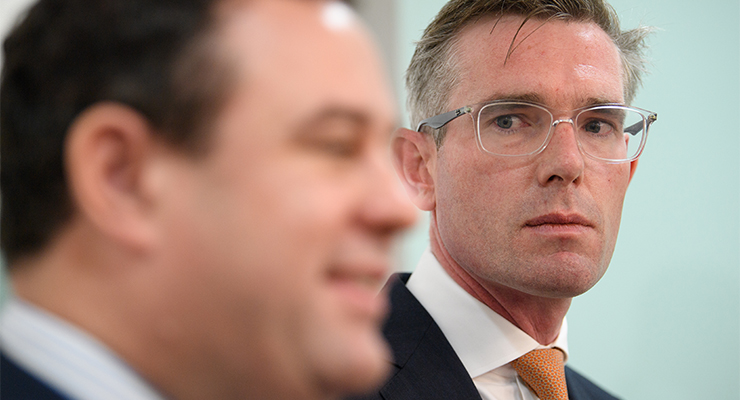
It’s unfair to say that Dominic Perrottet is using the standards of the Morrison ministry in deciding if a minister should be sacked. After all, he sacked Eleni Petinos over allegations — which she denies — of bullying and abuse of her staff.
Stuart Ayres, however, remains a minister, to the growing consternation and confusion of his colleagues, insisting everything about his role in the Barilaro scandal was above board.
Having been shown to have misled Parliament, and misled the public, over his very hands-on role in the selection of Barilaro, and seemingly to have misled his premier too, is as yet insufficient for Perrottet.
It’s interesting how what is deemed politically acceptable is changing. It’s now common for ministers to mislead Parliament with impunity — Scott Morrison blatantly misled Parliament (his UK counterpart too) without batting an eyelid. But a hint of workplace misconduct, and especially the dreaded term “bullying”, and the pressure is on — especially after revelations of just how toxic the Australian Parliament has been for staff.
Bullying of political and electoral staff once went on right across politics with near-complete impunity for the perpetrators, but it’s now getting close to a hanging offence if revealed.
What Perrottet’s strategy is for leaving Ayres in the saddle isn’t clear. Ayres, of course, is very powerful factionally within the NSW Liberal moderate grouping. He’s also based in western Sydney. That’s two reasons to not get rid of him. But he copped a mammoth swing in his seat of Penrith in 2019 that took his margin to 1100 votes, and after the past six weeks it’s hard to see him hanging on against Labor even if Perrottet can pick up seats elsewhere.
By sitting and doing nothing, Perrottet reinforces not merely the daily political damage to his government, he also confirms the growing impression of his lack of authority and leadership. It’s not good enough to argue that an errant minister is powerful factionally and thus a premier can’t move against them (cf. Daniel Andrews and Adem Somyurek). Either you’re premier or you’re not. Either standards apply or they don’t.
The focus now isn’t so much what the NSW Legislative Council inquiry will further discover, or what the inquiry commissioned by Perrottet, conducted by Graeme Head, will report, but on what ICAC will unearth about the scandal, with its greater powers of compulsion, its wiretap and document-gathering powers and capacity for private and public grillings of those involved.
Between the involvement of Ayres in alerting Barilaro to the role, his putative role in the selection of both the candidates and the shortlist, and the mysterious alteration by the selection panel of ratings of Barilaro and a superior rival candidate to displace the latter from top spot, conduct that would be covered by the ICAC Act’s definition of corrupt conduct may have occurred.
ICAC investigations, notoriously, drag on for an extended period. It’s possible we’ll still be talking about Barilaro, Ayres and Amy Brown all the way to next March. It makes it all the more inexplicable that Perrottet won’t move fast to assert his authority and reestablish some standards in a government that, once the best in Australia, is disintegrating before our eyes.








One of the best? How low is the bar? Think of how many Govt MPs have been lost to corruption and sexual assault investigations, Glady’s conflict of interest rewards to her MP boyfriend’s hometown, looking away when there were red flags aplenty about the kinds of deals that Macguire was trying to pull off with extremely dodgy characters, the admission that pork barrelling is “business as usual” for politicians, the complete rollover to the National Party allowing agribusiness to clear the entire Far North West and drain every river dry, building dams that will never hold water, gutlessness in tackling the coal monster. Throwing mountains of money to the cruel, criminal and decrepit greyhound racing industry. Ignoring the catastrophic loss of species habitat and biodiversity. Failing to address the housing, teaching, nursing, care crises. I could go on. Ye gods Bernard what are you on about?
Great comments Angela, which I totally and utterly agree with from beginning to end.
I think it is a bit of a stretch to call the NSW LNP Government as, “once the best in Australia”.
I was wondering where that came from. As this scandal has proven, not all the muck left with Gladys and Darryl.
I’m interested to know precisely when this ‘best’ era was?
“…. Askin”?
which begs the question when was the worst era…?
Probably under Kristina Keneally
I too was wondering just which , “NSW LNP Government” Mr Keane was referring to as, “once the best in Australia”.
Surely not those of the past many years that I personally can recall.
Was that before or after the icare scandals, Bjelke-Petersenesque anti-protest laws, draconian policies for strikes?
Quite possibly because Stuart Ayres has a bucket of excrement to tip on Dom if Dom tips one on him?
Matt Kean must be laughing all the way to the bank right now.
Ayres must know where the body is buried (as they say in the classics). There is no other explanation for Perrottet’s protection.
Just the one?
Yes, Kean is awfully quiet of late, isn’t he?
Why wouldn’t he be? When your opponents are rogering themselves in full public view you don’t let yourself be seen with them, you don’t pull a curtain around them, and you don’t tell them to stop!
Also, the sacking of Petinos just highlights the weakness of Perrottet’s position on Ayres.
girl vs boy.
Quite